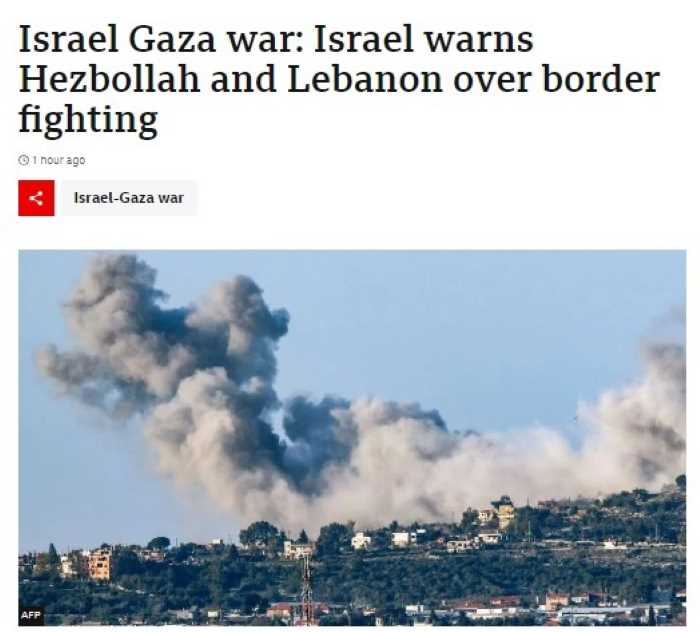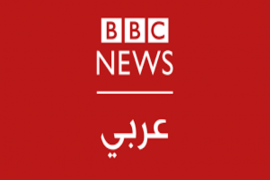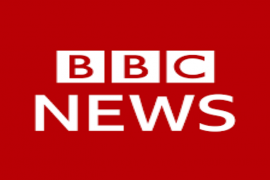In the past couple of weeks the BBC has produced several items on the topic of Christians in the Gaza Strip and Palestinian Authority controlled areas:
BBC PROMOTES GAZA CHURCH ALLEGATIONS IN FIVE ITEMS OF CONTENT
BBC NEWS WEBSITE AMPLIFICATION OF CHRISTMAS APPROPRIATING POLITICAL STUNTS
However, when a church was deliberately targeted on December 26th, BBC audiences saw no coverage of that incident.
“Nine IDF soldiers were wounded, one seriously, in an anti-tank guided missile attack in northern Israel on Tuesday, while evacuating a civilian who had been injured in an earlier Hezbollah attack on a church, the army said.
In the earlier attack, Hezbollah fired a missile from Lebanon at the St. Mary’s Greek Orthodox Church in Iqrit, moderately wounding a civilian in his 80s who was near the building. […]
As troops arrived at the scene to evacuate the wounded man, Hezbollah fired additional missiles, wounding the nine soldiers. One was listed in serious condition, while the other eight were in light-to-moderate condition. […]
The IDF said it targeted a Hezbollah site in Lebanon in response to the attack, as well as a building into which the operative who had launched the missile at the church fled.”
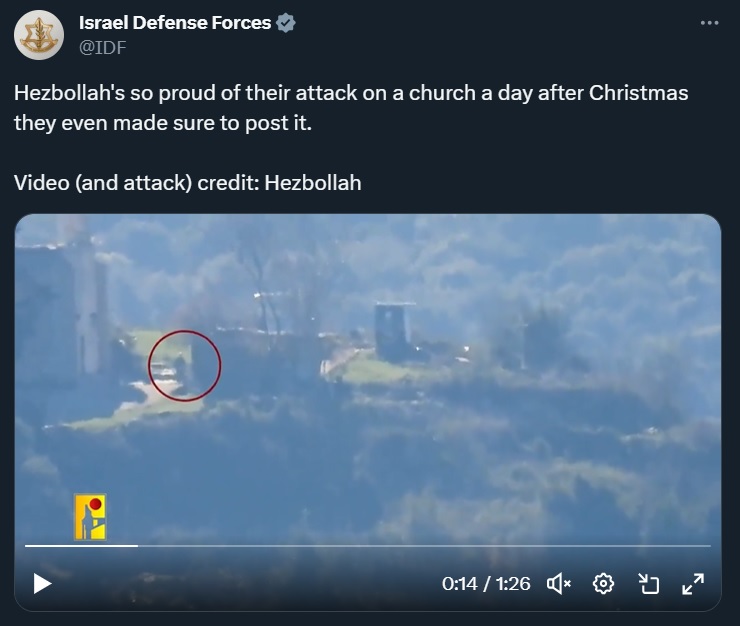
Additional locations – including a chicken farm – were also attacked by Hizballah on the same day.
“The military said that Hezbollah also fired a missile from near a mosque in southern Lebanon’s Yaroun at the Dovev area in northern Israel. […]
Projectiles were also fired at the Yiftah and Mount Dov areas on the border Tuesday. The IDF said it was shelling the launch sites with artillery in response.”
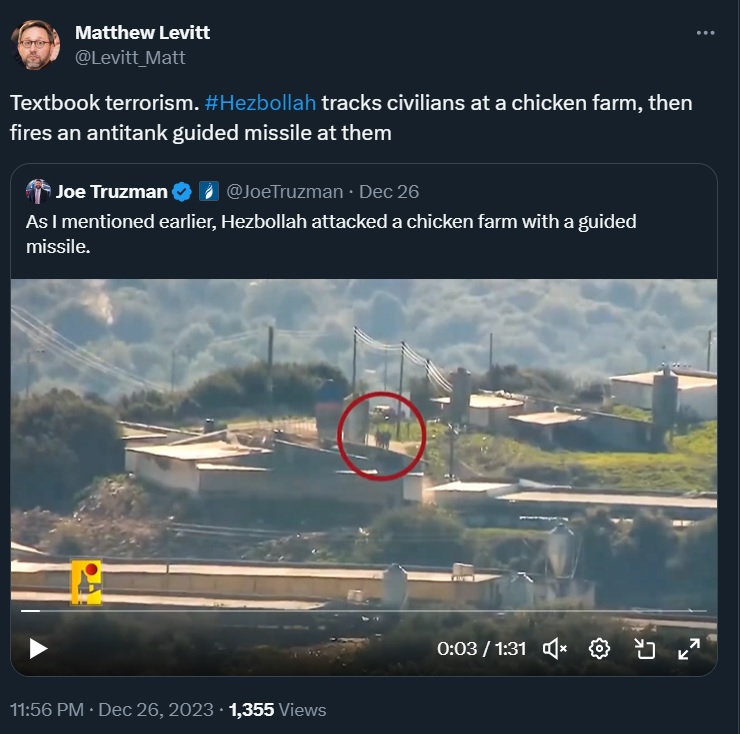
On December 27th communities close to Israel’s northern border again came under attack from Lebanon.
“Sirens sounded repeatedly in northern Israel on Wednesday as rockets fired from Lebanon pummeled the towns of Rosh Hanikra and Kiryat Shmona in a major escalation of violence along the restive border […]
At least 18 rockets were fired at coastal Rosh Hanikra at around 10 a.m. on Wednesday, in an attack that Hezbollah claimed was aimed at an Israeli Navy base in the area. At least six of the rockets were said to have been intercepted by the Iron Dome air defense system, with several others falling in open areas.
Several hours later, a second barrage was fired at the city of Kiryat Shmona. Six of the rockets impacted inside the city, causing damage to residential buildings and infrastructure, while another four landed in open areas within the municipal boundary, officials said. An additional three rockets were intercepted by the Iron Dome, with the remainder landing in open areas.”
None of those incidents on December 26th and 27th received any dedicated coverage on the BBC News website in real time.
On the morning of December 28th the BBC News website published a report credited to James Gregory which was originally titled ‘Israel Gaza war: Israeli minister warns Hezbollah over border fighting’ and in which readers were given the following tepid portrayal of Hizballah’s recent attacks: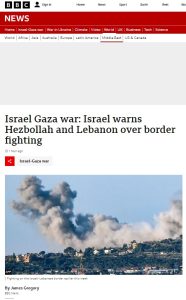
“There has been an increase in rocket fire and the use of weaponised drones by Hezbollah this week, with Israeli war planes quick to respond.”
Hours later the headline was changed to read ‘Israel Gaza war: Israel warns Hezbollah and Lebanon over border fighting‘ and the current version tells readers that:
“Cross-border exchanges of fire have been escalating since Hamas’s 7 October attacks on Israel.
On Wednesday, Hezbollah launched its highest number of cross-border attacks in a day since 8 October, security sources told Reuters.”
And:
“At the border, there has been an increase in rocket fire and the use of weaponised drones by Hezbollah this week, with Israeli war planes quick to respond.
On Thursday, Israeli forces said they intercepted a drone crossing into their territory from Lebanon.”
Clearly those vague descriptions do not adequately inform BBC audiences about the numerous attacks by Hizballah in the northern border region in recent days. Moreover, later versions of Gregory’s report promote an unhelpful statement which hinders audience understanding:
“But the Lebanese ambassador in the UK, Rami Mortada, said his country was on the receiving end of attacks and “the party that should hold back is Israel”.
“We are not interested in escalation – all sides need to de-escalate,” he told the BBC World Service’s Newshour programme.”
Gregory does however provide information about an incident in Lebanon on the night of December 26th:
“…on Wednesday, state media in Lebanon reported that a Hezbollah fighter and two of his relatives had been killed in an Israeli air strike.
The attack reportedly hit a house in Bint Jbeil, a town about 2km (1.2 miles) from the border with Israel.
A Hezbollah statement said one of the victims, Ibrahim Bazzi, was an Australian citizen visiting his family.”
According to the Australian media, both Ibrahim Bazzi and his elder brother Ali – for whom Hizballah put out a mourning notice – were Australian citizens.
“Australian born and raised Ali Bazzi moved to Lebanon to get married a few years ago.
Following the strike, Hezbollah announced he had been one of its fighters, according to the AFP news agency.
All three people — lbrahim Bazzi, Shorouk Hammoud and Ali Bazzi — had their caskets draped in Hezbollah flags at their funerals on Tuesday.”
Gregory continues: [emphasis added]
“More than 100 people have been killed in Lebanon since October – most of them Hezbollah fighters but civilians, including three journalists, are also among the dead.
On the Israeli side, at least four civilians and nine soldiers are known to have died on the Lebanon border since hostilities began. Thousands of civilians living in dozens of communities in the area have been evacuated by the army.”
In fact, those four civilians and nine soldiers were killed in Israel, close to the border with Lebanon. As reported by the Times of Israel, Hizballah has named 129 members who have been killed, mostly in Lebanon but some also in Syria. In Lebanon, another 16 Palestinian terror operatives, a Lebanese soldier and at least 19 civilians, three of whom were journalists, have been killed.
The earlier versions of Gregory’s report included the following portrayal of the Iranian funded terrorist organisation:
“Hezbollah, a Shia Muslim organisation, is designated a terrorist organisation by Western states, Israel, Gulf Arab countries and the Arab League. It was established in the early 1980s by the region’s most dominant Shia power, Iran, to oppose Israel at the time when Israeli forces were occupying southern Lebanon during the country’s civil war.”
The presence of Israeli forces in southern Lebanon “in the early 1980s” of course had nothing to do with the Lebanese civil war, as erroneously suggested by Gregory. While the first Lebanon war is often cited by BBC journalists as the reason for the establishment of Hizballah, that Iranian arm in Lebanon in fact came into being before the summer of 1982.
That segment was subsequently amended to read:
“Hezbollah – a Shia Muslim organisation – is designated a terrorist organisation by Western states, Israel, Gulf Arab countries and the Arab League.
Funded by Iran, it is one of the most heavily-armed, non-state military forces in the world.”
It is all too obvious that BBC audiences are not being provided with anything approaching a full account of events in communities along Israel’s northern border. That of course means that their ability to understand the context of any future developments is already compromised.
Related Articles:
USUAL MANTRAS IN BBC NEWS REPORT ON HIZBALLAH DESIGNATION
BBC NEWS WEBSITE REPORTING ON THE DEATHS OF JOURNALISTS
BBC NEWS ONCE AGAIN ERASES UNSC RESOLUTION 1701 FROM A LEBANON STORY

